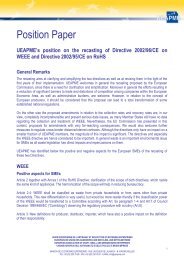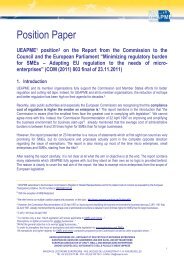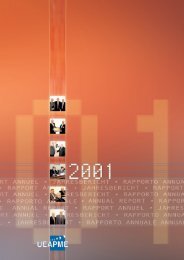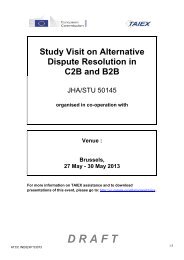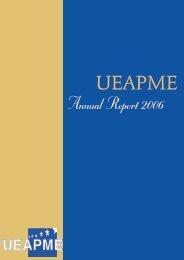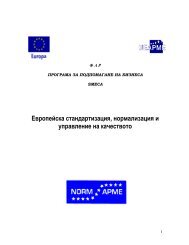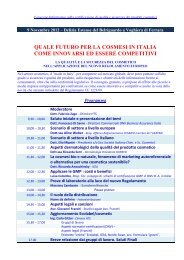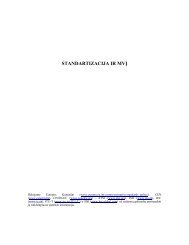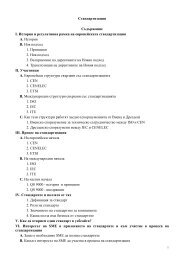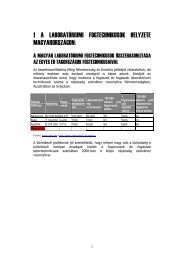Position Paper - UEAPME
Position Paper - UEAPME
Position Paper - UEAPME
You also want an ePaper? Increase the reach of your titles
YUMPU automatically turns print PDFs into web optimized ePapers that Google loves.
payments and other income support may help the farmer but how can economic operators prevent?<br />
4. What do you see as the most significant impacts of the reform scenarios and the related options for<br />
policy instruments? Which actors would be particularly affected if these were put in place?<br />
An integrated territorial approach to rural development would better help to meet the strategic priorities of<br />
EUROPE 2020 - smart, sustainable and inclusive growth. All actors in the rural areas would better benefit. A<br />
Police for rural areas must take into consideration the needs of not only the agricultural population but of all<br />
groups like entrepreneurs, employees, families, elder people, young people etc. Efficient approaches to<br />
promoting rural development cannot be-discriminatory across sectors. Life-Quality in a rural area is not only<br />
defined by the number of farmers and ha. of cultivated farmland but more over of many different aspects of daily<br />
life: public infrastructure (kindergarten, schools etc.), food shops, possibilities for leisure and entertainment<br />
activities, the possibility to choose a job in different sectors etc.<br />
The three levels of players in rural areas as agricultural, non- agricultural and public sector activities should all<br />
be taken into consideration.<br />
In the running period of the program for rural development only a very few countries choose to broaden their<br />
approach and implemented measures like support for business creation and development, .Only about 2% of<br />
the total expenditure is directed to this measure in the EU. Surprisingly most of the new member states have<br />
made much more use of this measure.<br />
In our opinion this is the crucial point how to adopt a new approach to rural development. We need a clear<br />
commitment from the commission to see rural development policy also as policy for a vital development of the<br />
whole economy in rural areas. In this sense we are very doubtful that things will change in the new period after<br />
2013 if the commission will not put a more stringent objective to measures where agriculture is not the primarily<br />
beneficiary.<br />
5. To what extent will the strengthening of producer and inter-branch organizations and better access<br />
to risk management tools help improve farmers’ income levels and stability?<br />
No separate response.<br />
6. What environmental and climate-change benefits would you expect from the environment-targeted<br />
payments in the first and the second pillar of the CAP?<br />
The aim of these direct payments would be to ensure that the impact of companies in both pillars of the CAP on<br />
the environment and climate change in their area is improved. Therefore in principle there would be no reason<br />
to limit direct payments to companies of one of the two pillars.<br />
However, it has to be questioned how it is possible to check that these direct payments, made through public<br />
money, are really used by first and second pillar companies to ensure environmental and climate change<br />
benefits. It is clear that it is not possible for public authorities to carry out regular checks on all companies .<br />
Therefore, there might be a very high risks of frauds linked to this practice.<br />
7. What opportunities and difficulties do you see arising from a significant increase of the rural<br />
development budget and a reinforcement of strategic targeting?<br />
See answer to question 4. New opportunities could arise for strengthening measures to help to reinforce<br />
cooperation between farmers and economic operators especially smaller food processing companies. Measures<br />
in the program for rural development specially designed for the needs of such cooperation could very much<br />
MAISON DE L'ECONOMIE EUROPEENNE - RUE JACQUES DE LALAINGSTRAAT 4 - B-1040 BRUXELLES<br />
TEL +32 (0)2 230 75 99 - FAX +32 (0)2 230 78 61 - E-MAIL info@ueapme.com<br />
2



